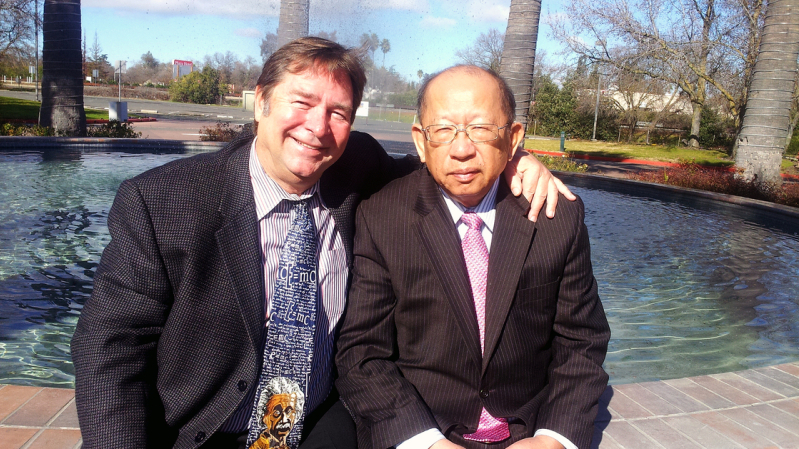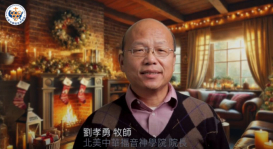
Homeless inventor Mike Williams testifies of God’s intervention through ‘angels’ when his life hanged on a thread.
His encounter with a former homeless veteran, a case worker, and a 72-year-old urologist turned his life around. His story of second chance was first picked up by Los Angeles Times and will be made into a movie.
Last August night, Williams was beaten and left for dead at the rose garden at a Sacramento Park. Two thieves grabbed his backpack and took his laptop – which he’d been using to keep notes so someday he could tell everyone his story.
Growing up in a small pink trailer in Pollick Pines, Calif., Williams was on his own by 14, when he started working two jobs while attending high school. He served in Vietnam, and then made his way to the San Francisco Peninsula.
During a dental checkup in the early 1980s, Williams asked his dentist whether he had a camera that would let him look inside patient’s mouths. When the doctor said he didn’t, he replied that he will make one.
Williams started the intra-oral camera company, but was not able to reach profitability; in 1991, he sold the company.
In his second venture, Williams’ company generated more than $13 million in annual sales in manufacturing intra-oral dental cameras. But the expenses outpaced the revenue stream. He once again had to sell it.
At that time, Williams and his family lived in Atherton, Calif. Their home had a pool, tennis court, and horses. Because the second venture didn’t work out, he had to move his family, because the second venture didn’t work out.
In his third dental technology venture, Williams’ venture partner joined with other investors to edge him out, resulting in the biggest loss of his career.
In 2009, Williams fell deeper into debt for caring for his aging in-laws. The bank foreclosed on the family’s home in 2009. And a group defrauded about $2.5 million in a scam from him in Florida. His 28-year-old marriage dissolved the next year.
While holding about 20 patents – including one for the first intra-oral camera and another for a wire catheter camera for heart surgery – Williams became homeless at 60 years old.
He loaded a few belongings into his 2004 Nissan and drove off. He thought he would find a job washing dishes and a place to live, but he didn’t.
“I cried a lot and gave up many times and even thought about ending it all but I couldn’t do that to my kids,” he said.
For a while he lived out of his car, but once he fell behind on the car payments, he took shelter in a dumpster.
Although William’s three grown children helped when they could, they had their own families to take care and other limitations.
“I found out that I was really nothing, and that was very hard for me to grasp; the fact that no one wanted me around,” he told NPR. “I was something nobody wanted to see or be involved in, and that crushed me.”
After the severe beating sustained at the Sacramento Park, Williams then walked two miles to an emergency room. He didn’t have health insurance and waited for 19 hours before a doctor saw him.
He was then examined with a hernia and pneumonia and the doctor referred him to VA hospital. At the VA ER, Williams was told he needed surgery immediately, but he needed to request to see a surgeon at out-patient clinic. Following the doctor’s instruction, Williams waited for the clerk to schedule an appointment for him, but was told to come back in 90 days.
Without anywhere to go and in utter despair, Williams sat down and started to pray, “I remember sitting in the corner crying in pain and asking God to forgive me for all my sins…and my shortcomings…”
Just then, something happened.
“For the first time in my life God had 100 percent of my attention,” he said.
An old veteran sitting next to him told him that he was homeless for over three years and finally got off the streets with help from a VA case worker named Kristine Flowers. She would be in the office that afternoon, but Williams would need an appointment to see her.
“I kept praying to God to help me as I waited to see Mrs. Flowers,” he said. Without an appointment, Williams waited until everyone left. And as Flowers was leaving and walking by him, he stopped her and started telling her his story.
As he was telling his story, Flowers grabbed his hand and told him not to worry any longer and gave him the last remaining bed at Salvation Army Shelter.
“I started to cry and so did she,” he said.
“Don’t tell me that God isn’t real…angels do exist. You never know when God uses one to answer your prayers,” he said.
Williams said didn’t have a chance to get the veteran’s name, but he is deeply thankful to him for saving his life.
“I know that God asked Mrs. Flowers to step in as part of his miracle to show me his power,” he said. “I’m not alone anymore. God is my father and my best friend who really loves me.”
At the Salvation Army shelter, Williams learned that his prostate also had been torn.
That was when Williams met with Dr. Jong L. Chen, who later operated on his injury. To Williams, the beating seemed like a blessing in disguise.
“My biggest fear was that I’d lose my faith,” Williams told Los Angeles Times. “But it took those guys to beat me up for me to meet Dr. Chen.”
Chen had been practicing medicine in Sacramento for four decades while advocating for democracy and human rights in his native Taiwan.
Before William’s surgery, Chen heard him chatting with the operation room technician about the nanometer range on the laser. During the post-op visit, doctor and patient discussed Williams’ inventions – among them tiny cameras that peer into the heart and joints – and his latest big idea.
This idea came to him while he lived in the lidded dumpster that he had lined with cardboard and provided his only privacy. He envisioned a humane alternative: molded, durable survival pods.
Chen later called Williams at the Salvation Army shelter and asked him to bring all his patents to a breakfast meeting at McDonalds’.
“So I asked Williams how come an educated man like himself did not try to find a way to help himself and others like him…After hearing about the despair and torment he felt when being looked down upon, I pledged to offer my assistance if he could think up a solution,” said Chen, according to Taipei Times.
During that meal, Williams talked about his idea to invent a secure, safe place for the homeless and people that are displaced in society.
Then Chen took a leap of faith. His acceptance stunned Williams.
“I’ve never had a friendship like this,” said Williams, according to LA Times. “My heart has changed.”
Today, the two men are partners in a start-up venture Step Housings System Inc. that aims to use William’s street insights to help others. Chen has brought Williams out from the shelter and helped him secure a small apartment; the doctor pays the $1,000 monthly rent. He also took Williams to Macy’s, picking up leather dress shoes and a charcoal-colored suit, according to LA Times.
When they shook on the partnership, Williams did not let go.
Chen said the faith of his Protestant parents had played a major role in shaping his life perspectives; money had never been a priority in his life and that it did not matter whether he was paid for the treatment he provided, reported the Taipei Times.
“To me, a patient is a patient, no matter what kind of status [they] have,” Chen told NPR. “They need the help, [and] we can give him the help.”
Williams now works out each morning at his apartment complex gym. For his street friends, he made turkey sandwiches at Thanksgiving and soup and pasta salad at Christmas.
Weighing 500 pounds, the 6-by-8-foot stackable pods, molded from strong fireproof fiberglass, will be delivered pre-assembled and fully furnished. It will have a single bed, sleeping bag, pillow, first aid kit, mirror, chemical toilet, solar power capabilities, plexiglass doors and windows and battery-operated heaters and fans.
Williams envisions the pods could be rented at airports by travelers and provided to homeless people including meals, showers, laundry facilities and security.
The dual have also formed a nonprofit foundation that will allow donors to sponsor pods to give the homeless a second chance.
Their first goal is to create a National prototype Pod community consisting of 250 pods that will be placed on at least 20 acres of land located outside the city limits with transportation provided for residents. All the guests will be employed in farming, manufacturing and food services and programs to help support the community. Guests can stay up to one year.
The Pod prototype community may provide a permanent solution to homelessness.




![[Exclusive Interview] A revelation within the brink of life and death — Meg Leung’s mission in Christian art](https://www.gospelherald.com/media/cache/thumbnail/7/21/72163sp_273w_150h_1x_1y.jpg)


